Rancid Poppy Seeds

Poppy seeds are similar to most other fresh foods and spices; they can expire or worse… get spoiled. Foods with high oil content can become especially unpleasant, which in this case can lead to rancid poppy seeds. As food prices continue to increase, it is as important as ever to keep foods fresh. Over the past week, our team has been researching and analyzing methods for keeping ingredients fresher longer. After receiving several questions about seeds, I decided to dedicate an entire post to identifying and avoiding rancid poppy seeds.
It’s important to remember that poppy seeds have many health benefits that are wasted with spoiled seeds.
Guide to Avoid Rancid Poppy Seeds
Ever tasted a poppy seed muffin that felt flat and strangely bitter? That disappointing bite comes from rancid seeds. When poppy seed oils oxidize, they trade their nutty aroma for a paint‑like smell and create free radicals that can irritate sensitive stomachs. Fresh seeds sing with subtle sweetness and healthy fats, but rancid ones sabotage flavor, upset digestion, and waste your hard‑earned baking time. Do not let this happen!
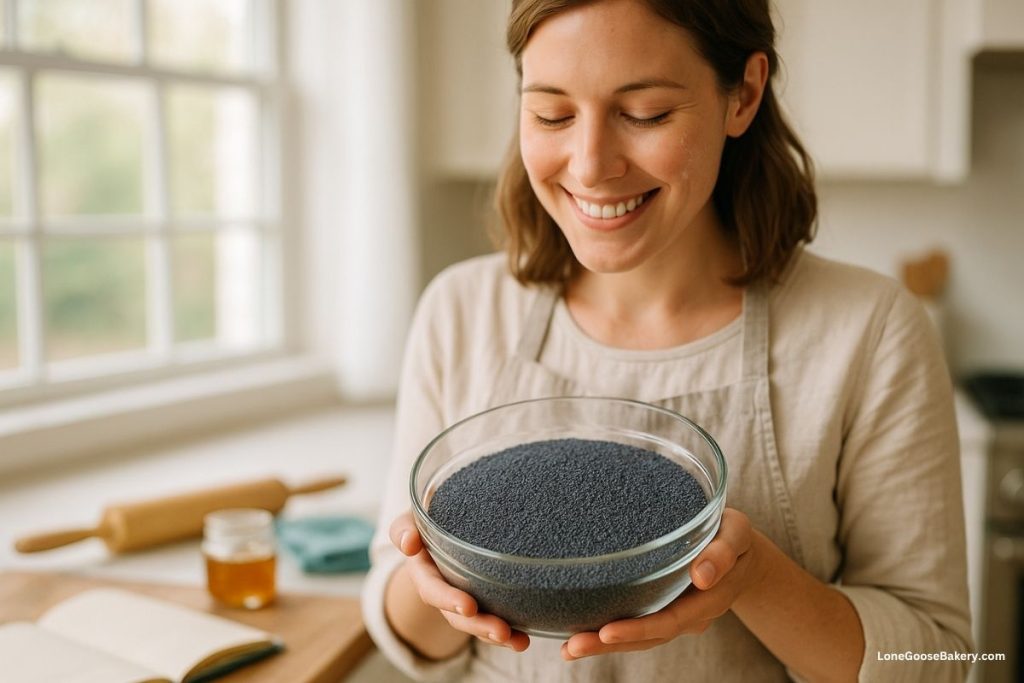
This guide will help you identify and prevent rancid poppy seeds. Fortunately, poppy seeds are relatively shelf stable, so it is fairly easy to keep them fresh if you follow simple instructions. As a bonus, these same methods can be used for other seeds as well!
Signs of Rancidity
- Paint Like Odor – Give the seeds a quick sniff. Fresh seeds smell faintly nutty, almost like warm pastries. If you pick up a scent similar to wet paint or varnish, oxidation has taken over and the seeds have gone bad.
- Color Shift – Pour a teaspoon onto a white plate. Healthy seeds are a deep blue‑gray with a dry, matte finish. Rancid seeds fade to gray‑brown, develop tiny cracks, and may look slightly oily from broken-down fats.
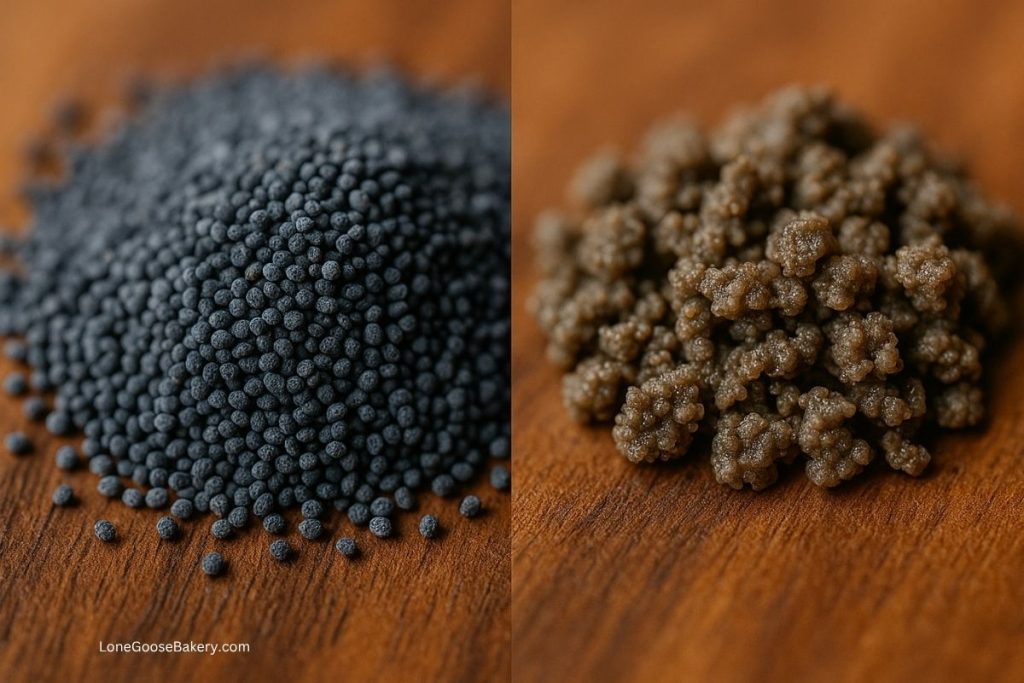
You can learn more details on poppy seed appearance on my related post.
5 Step At Home Freshness Test
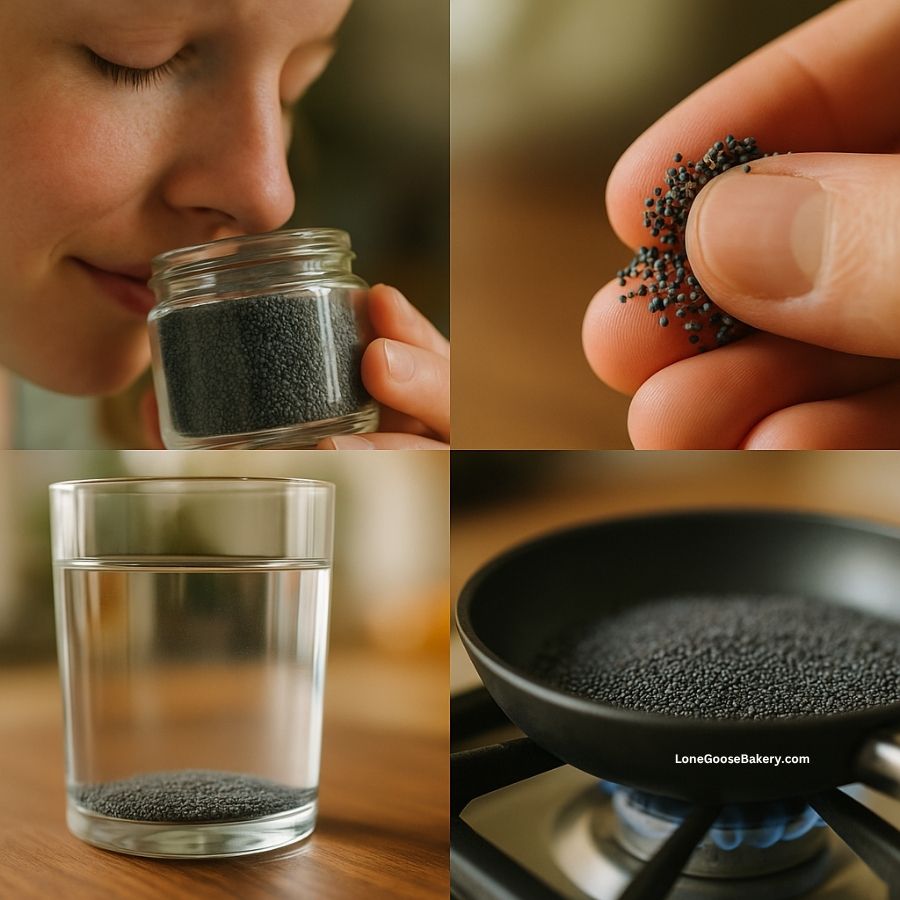
- Sniff Check – Scoop a pinch of seeds and breathe in gently. Fresh seeds smell lightly nutty, almost like warm pastry. If you detect a paint‑like or chemical aroma, the oils have turned and it is time to toss them.
- Rub & Warm – Place a few seeds between your fingers and rub briskly for ten seconds. The friction warms the oils and amps up aroma. Nutty is nice; sharp or sour means rancid.
- Water Float – Drop a teaspoon of seeds into a glass of room‑temperature water. Good seeds sink quickly because they are still dense and oil rich. Rancid or dried‑out seeds often float or linger mid‑glass.
- Light & Color Scan – Spread seeds on a white plate and slide it near a sunny window. Healthy seeds shine blue‑gray and matte. Any patchy gray‑brown or glossy spots signal oxidized oils.
- Quick Fry Test – Heat a dry skillet to medium, add half a teaspoon of seeds, and stir for twenty seconds. Fresh seeds pop lightly and release a sweet, nutty scent. Bitter smoke or no aroma at all means flavor loss.
Storage Best Practices
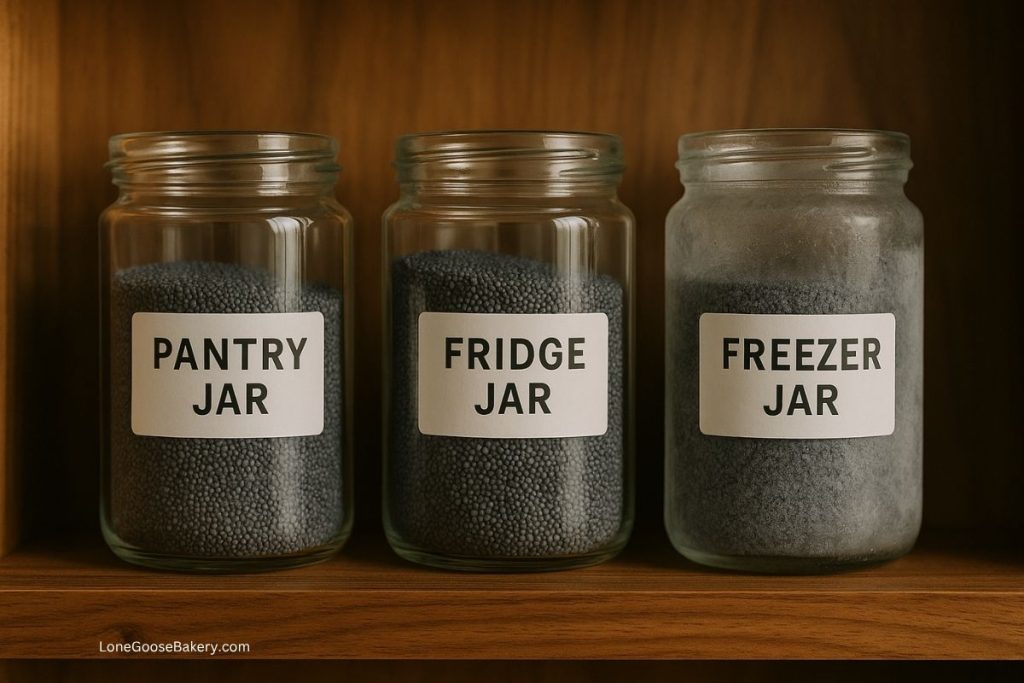
- Choose Airtight Glass – Mason jars or swing‑top bottles lock out oxygen better than plastic bags.
- Keep it Cool – Pantry storage is fine for short term, but the fridge can triple shelf life. For the longest lifespan pop jars in the freezer.
- Light is the Enemy – During the short term storage, store jars in the back of a cabinet or wrap them in a dark cloth sleeve to block UV.
- Track the Date – Use a small piece of painter’s tape on the lid to mark purchase date, making tracking easy.
- Avoid Moisture Swings – Scoop with a dry spoon only; condensation invites clumping and early spoilage.
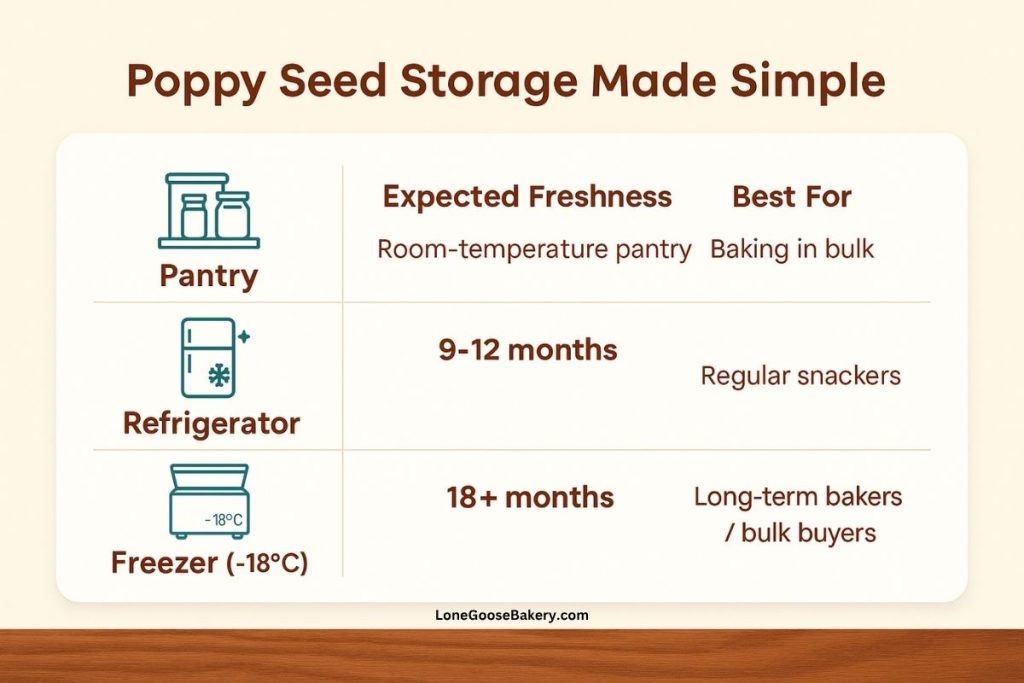
Health and Flavor Impact
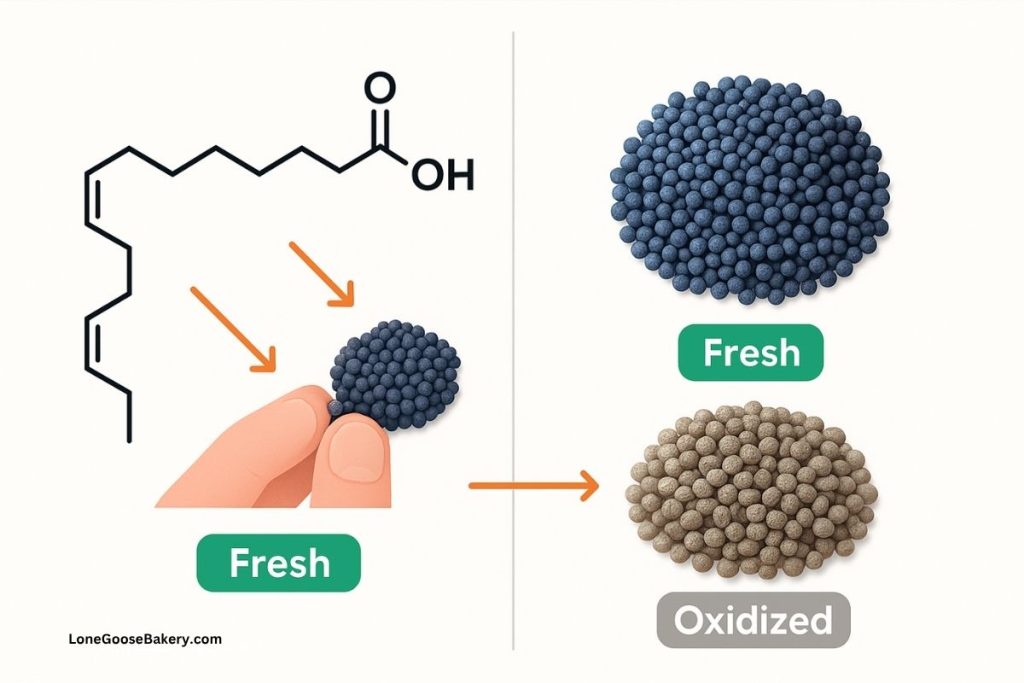
We’re going to get a bit into the science here. Poppy seeds are loaded with healthy polyunsaturated fatty acids. When exposed to oxygen, heat, or light, those fats break apart in a process called lipid oxidation. The breakdown creates aldehydes and ketones that smell like paint and taste bitter. These compounds not only flatten flavor but can produce mild gastric irritation for sensitive eaters. By keeping seeds cool and airtight, you slow oxidation and preserve both taste and nutrients.
Do NOT Consume Rancid Poppy Seeds

Rancid poppy seeds are sneaky troublemakers that can crash your baking party before the first bite. When the natural oils oxidize, they create off‑flavors and compounds that can irritate a sensitive stomach, and they may even contain mold. Instead of that warm, nutty goodness, you get bitterness and a faint paint‑like aroma that signals spoilage. Eating a spoonful may leave you queasy or give you an unwelcome case of digestive distress. The longer seeds sit unsealed or under bright light, the faster those unhealthy fats develop. Trust your nose and eyes: if they look dull, clump, or smell odd, it is time for the compost bin. Fresh seeds reward you with clean flavor and none of the tummy aches. Stick with quality, properly stored Blue Bird seeds to keep every recipe (and your gut) happy.
FAQ
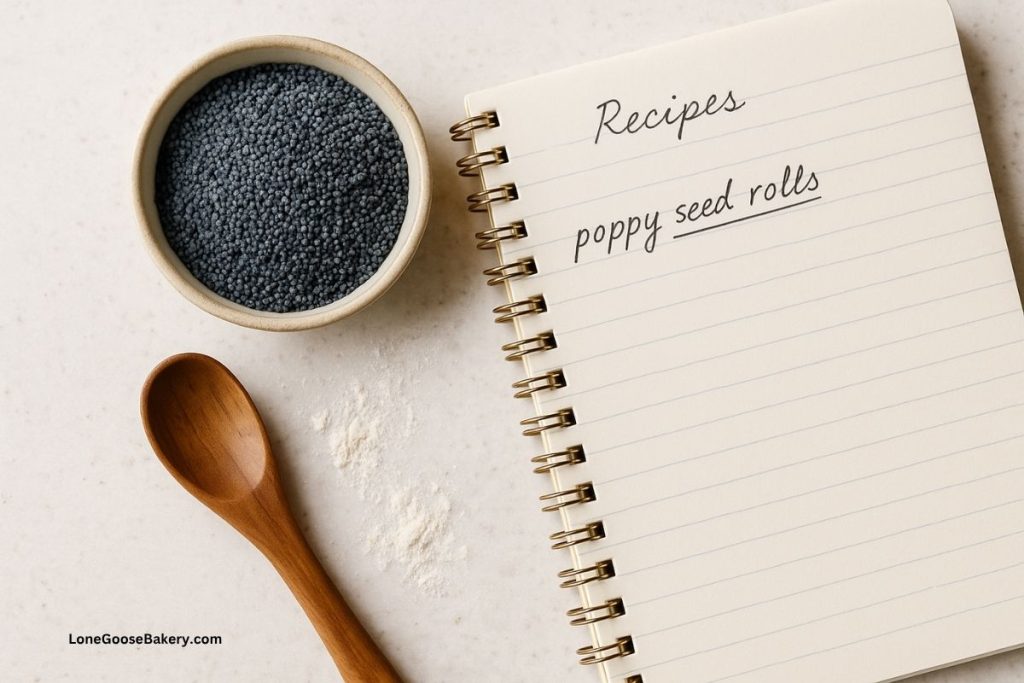
Q1. Can I still bake with slightly bitter seeds?
A1. You can, but bitterness will show up in the final dish. For best flavor swap in fresh seeds.
Q2. Do whole poppy seeds need refrigeration after opening?
A2. Yes, cooling slows down oxidation and extends freshness far beyond pantry life.
Q3. Why do my seeds look oily?
A3. Oil beads on the surface mean the cell walls have broken down, a classic sign of rancidity.
Q4. Is it safe to toast dull‑colored seeds?
A4. Toasting disguises some off‑flavors but will not reverse rancidity. If aroma is still off after toasting, toss them.
Q5. How do I revive stale seeds without wasting them?
A5. Mix them into bird feed or compost rather than baking. Fresh seeds deliver the flavor punch your recipes deserve.
Need Guaranteed Fresh Poppy Seeds?
If you’ve ever cracked open a bag of “bargain” poppy seeds only to find weak flavor and mystery crumbs, you already know why vendor quality matters. I source our Blue Bird seeds straight from small growers who test every batch for freshness, purity, and that signature deep blue‑gray color. You’ll taste the difference in every muffin, bagel, and kolache you bake—nutty aroma, perfect crunch, zero bitter surprises. Treat your recipes (and taste buds) to the real deal!
If you are short on time, you can avoid rancid poppy seeds by purchasing quality poppy seeds from a trusted vendor. Once you receive your seeds, make sure to follow my 5 Tips for Extending Poppy Seed Shelf Life.
In Summary
Fresh poppy seeds can make your baked goods shine, bu rancid ones will ruin the flavor and might even upset your stomach. Now that you know how to spot the signs of spoilage and how to store your seeds the right way, you’re set up for long term baking success.
Always trust your senses, and when in doubt, toss them out. For guaranteed freshness and bold flavor, grab a bag of our high quality Blue Bird Poppy Seeds. Your recipes (and your stomach) will thank you!



I bought a white poppy seeds but it turned black. Are they still good? It has no rancid smell. Just wondering if I can still use it in miffins
Yes, the white poppy seeds are still good, as long as they don’t have an off smell or taste. They can naturally darken over time as they are exposed to air. Just make sure they also don’t have any mold. Thanks for the question
I live in Florida and I have to protect my seeds with a vacuum sealer to keep the moisture out. If I don’t they won’t even last a week – and you’re right about the smell. Heck it’s bad enough to make my eyes water
Patricia – thanks for the comment and the tip. I can’t feel too badly for you down in Florida, you do have beautiful beaches to go with the humidity 🙂